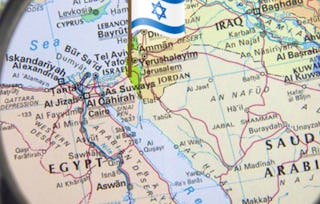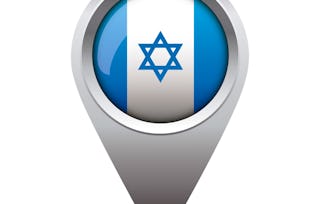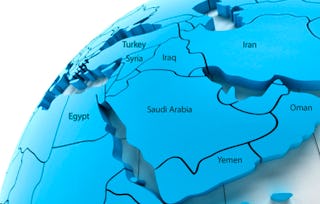This course deals with the Israeli politics, economy, society and culture, since its creation in 1948 till today. It analyzes the construction of the Israeli historical narrative as an identity-building narrative, intending to inculcate a collective memory to a diverse society. We will focus on key events and essential components that shaped the Israeli society from the fifties till the present. We will also discuss the changes that the Israeli society experiences in its almost seventy years of existence and how it affects its politics and culture. Among the topics we will discuss issues such as immigration, economic transformation, political upheaval, religious Zionism and post-Zionism, privatization and Americanization, Holocaust increasing role in shaping Israel's identity, diversity and multiculturalism, as well as the enduring conflict with the Palestinians and the Arab world.

The History of Modern Israel - Part II: Challenges of Israel as a sovereign state
Ends soon: Gain next-level skills with Coursera Plus for $199 (regularly $399). Save now.

The History of Modern Israel - Part II: Challenges of Israel as a sovereign state


Instructors: Professor Eyal Naveh
12,064 already enrolled
Included with
(342 reviews)
Skills you'll gain
Details to know

Add to your LinkedIn profile
5 assignments
See how employees at top companies are mastering in-demand skills

There are 5 modules in this course
In the first two decades of its existence the new state of Israel faced many challenges. Israelis at this period faced economic difficulties, insecure boarders, political challenges and social upheavals. Led by the Labor party, the new state absorbed huge numbers of Jewish immigrants who came primarily from Arab countries, as well as a significant number of Holocaust survivors. These projects and others required a collective effort and a spirit of commitment at the expense of individual needs and aspirations. Thus we can define Israeli society in those years as a mobilized society.
What's included
13 videos2 readings1 assignment2 discussion prompts
From the late Sixties until the late Seventies Israeli society experienced two major wars that had a huge impact on life in the country, as well as one peace agreement that altered the status of Israel in the area and reinvigorated hope for a better future.
What's included
9 videos2 readings1 assignment2 discussion prompts
In this lesson we will discuss the essential developments that transformed Israeli society at the end of the twentieth century.
What's included
10 videos1 reading1 assignment1 discussion prompt
This segment of the course attempts to explore the very elusive topic of Israel’s changing identity.
What's included
7 videos3 readings1 assignment6 discussion prompts
The last part of the course will explore current issues that characterize Israel today. The "Start Up Nation", Social inequality, the Political fragmentation & the difficulties of being situated in the unstable and non-democratic Muslim Middle East.
What's included
8 videos1 assignment3 discussion prompts
Instructors


Offered by
Explore more from History
 Status: Preview
Status: PreviewTel Aviv University
 Status: Preview
Status: PreviewHebrew University of Jerusalem
 Status: Preview
Status: PreviewTel Aviv University
 Status: Preview
Status: PreviewTel Aviv University
Why people choose Coursera for their career




Learner reviews
342 reviews
- 5 stars
82.50%
- 4 stars
14.86%
- 3 stars
2.04%
- 2 stars
0%
- 1 star
0.58%
Showing 3 of 342
Reviewed on Feb 3, 2019
Great continuation to the first part - would totally recommend it to learn about this interesting country!
Reviewed on Mar 10, 2021
This is an excellent course. The presenters were very knowledgeable and the material well presented
Reviewed on Aug 31, 2021
Excellent course. Critical perspective. The last session was particularly helpful in understanding Israel.
Frequently asked questions
To access the course materials, assignments and to earn a Certificate, you will need to purchase the Certificate experience when you enroll in a course. You can try a Free Trial instead, or apply for Financial Aid. The course may offer 'Full Course, No Certificate' instead. This option lets you see all course materials, submit required assessments, and get a final grade. This also means that you will not be able to purchase a Certificate experience.
When you purchase a Certificate you get access to all course materials, including graded assignments. Upon completing the course, your electronic Certificate will be added to your Accomplishments page - from there, you can print your Certificate or add it to your LinkedIn profile.
Yes. In select learning programs, you can apply for financial aid or a scholarship if you can’t afford the enrollment fee. If fin aid or scholarship is available for your learning program selection, you’ll find a link to apply on the description page.
More questions
Financial aid available,





